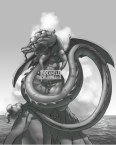You could say that I was in the publishing business since my early twenties… loosely. I took the ‘over-the-transom’ approach to getting published back then. After sending several manuscripts through the mail and receiving standard rejection letters in return, I decided to take a more direct approach. I worked as a newspaper delivery boy for the Wall Street Journal for the express purpose of gaining access to the publishing houses’ offices in Manhattan.
I looked up the magazine and book publishers I wished to contact in the Writer’s Marketplace as before, but instead of mailing to the Fiction Editor or Sci-Fi Dept, I would go to the offices that were on my route or close-by and learn the person’s name in charge. After addressing my package correctly, I slid it through their door. They don’t exactly have transoms anymore, but if they do, they have in all likelihood been sealed shut for decades.
Over-the-transom is a reference to bypassing the standard business practice and tossing your unsolicited material directly into the publisher’s office. Hence, by slinging those fifty pounds of newspapers on my back every night, I was able to sidestep the building’s doorman, the first line of defense, the mail-room clerk, whose job was to stuff the SASE with the standard rejection notes, and possibly the editor/publisher’s assistant to get my work directly to the person I wanted.
Did it work? Well, I received personal rejection letters in some cases, so I counted those as successes. My point is, as a writer, you should be willing to try everything possible to get published. As a publisher... I got a PO Box, as I do not fancy people showing up at my door in the dead of night to toss their latest and greatest over my transom, which fortunately, I do not have either. But there is a better idea.
If you are unknown, reach out to the independent publisher like me; but do so in the correct way. Technically speaking, there are three forms of publishers; the big boys, Random House, Penguin, etc., or as they are known, traditional publishers; the independents, such as myself, RockHill Publishing LLC, and the self/vanity publishers in the vein of Xlibris and Author House. Do not be fooled, some self-publishing houses are little more than vanity presses. They will print anything and usually for a sizable sum. You should not have to pay for your own publishing.
Indie publishers are more like the big boys. Some are in fact subsidiaries of a parent company operating independently on a lower scale and for a particular genre, thus the name. Others, like RockHill, were conceived not to merely publish one’s own writing but also that of those who produce exceptional work in the same genres. We, like the big houses, follow the same rules, scrutinize the work’s quality, and ask the same question, is it sell-able? But unlike them, we are not tightly bound to hitting home runs. Therefore, we take more chances.
Major houses look at what is selling presently and say, “give me more of the same.” They are willing to put out ten books of the same type that sold last year, in the hope that one will sell again this year. Plus, they have a set stable of writers, whom they support with much fanfare, and aim for their names to remain recognizable to the readers who buy these authors regularly. As a result, traditional publishers are slow to change and rigid in their requirements.
An indie publisher is more flexible; we can take a swing at the curve ball without fear of it being a strike. First, we deal in smaller margins and you are not getting a large advance, if any, from an indie publisher. We do limited runs, numbering anything from ten to a hundred, and naturally, on-demand printing. You will also be required to foot the bill for your own publicity work. But do not assume that is an automatic minus to your name.
For example, a big house gives you an advance of say, $10,000.00. I know, sounds quite generous. They then set up interviews/readings/signings, and fully expect you to show up without further payments – after all, you already have ten grand to get started – and you will not make any more money until your book sales surpass that mark. As a result, you oblige and go do whatever they have set up.
On the other hand, an indie publisher may send you some copies of your book to hawk, and if you require a larger quantity, you must purchase them. So, if they set up interviews or readings/signings, it is true that you have to cover the expenses yourself, but looking at it logically, you realize that it is basically the same procedure as with the big players anyway. Therefore, it behooves you to go, because you will not make money if you do not.
Indie publishers are popping up all the time. In fact, many writers are choosing to become publishers as well to get their own work in print; others are doing it to share the load and cost. If they are a true publishing house or trying to be, then, they will be looking for two to five authors to publish each year. For that reason, the benefit of finding and working with an indie publisher is that he is inherently focused on your book and success just as you are, because it means his own success. So, do your due diligence.
Most traditional publishers pay close to nothing until you prove yourself. On the other hand, Indie publishers print less at a time but can often offer better royalties than the large houses, but likewise, should not charge for editing or publishing. Do your homework and send only to those who are looking for writers in your genre. Edit and prepare your work meticulously and follow the publishers’ directions.

 RSS Feed
RSS Feed
